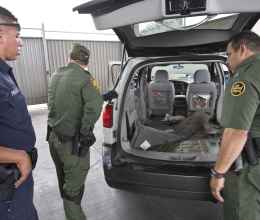The policy requires attorneys wear protective gear that even hospital workers can’t obtain
LOS ANGELES — Immigrants in detention centers have a long-established legal right to meet with attorneys, but U.S. Immigration and Customs Enforcement (ICE) officials at the Adelanto ICE Processing Center have issued a new policy that essentially bans those visits.
The center now requires attorneys to wear personal protective equipment (PPE), including N-95 or surgical masks and eye protection. But it’s near impossible to get access to all the required high-end gear — it’s so scarce that hospital workers can hardly find it. And Adelanto ICE officials have taken no steps to allow effective alternatives to in-person visitation, such as accessible phones or videocalls.
Today, a temporary restraining order was filed in U.S. District Court in Los Angeles to force ICE to allow for private communication between attorneys and people who are incarcerated at the Adelanto center, whether by phones or other means.
The action was filed in court by the American Civil Liberties Union Foundation of Southern California, the Immigrants Rights Clinic at Stanford Law School, and the law firm Sidley Austin LLP.
It was filed against ICE, the U.S. Department of Homeland Security, and GEO Group Inc., the private company that is contracted to operate the facility.
In 2018, attorneys filed a lawsuit challenging the lack of attorney access to immigration detainees. That suit is still pending — the action today calling for a temporary restraining order was taken because of the PPE requirement that makes effective consultations even more unlikely.
“ICE and GEO have effectively shut off visitation for immigration detainees without providing an alternative, cutting them off from the outside world,” said Eva Bitrán, staff attorney at ACLU SoCal. “Unless the Court intervenes, detainees may be forced to proceed with their cases without confidential, accessible calls to their lawyers. The results could be devastating.”
For immigrants facing deportation, access to attorneys can make a profound difference in the outcome of their cases — immigrants with lawyers statistically have an overwhelmingly better chance of being able to stay in the U.S. For asylum seekers, it can be a matter of life or death.
Telephone access — often detainees' main conduit to the outside world — is severely restricted in Adelanto with only a handful of phones available to a detention capacity of nearly 2,000 people. And often, some of the phones are out of order.
Phone conversations in the facility are not only non-confidential, but also so expensive to the point that many detainees have no opportunity to use them for effective consultations. To make matters worse, the phone system won't allow detainees to leave recorded messages or navigate an automated menu to reach a live individual — it cuts them off if a call is not answered by a live person.
Face-to-face meetings were highly restrictive even before the implementation of new PPE policy.
“Constitutional rights don’t disappear in a pandemic,” said Derin McLeod, a law student with the Stanford Immigrants’ Rights Clinic. “The government must ensure that immigrant detainees can communicate safely and confidentially with their lawyers.”
The temporary restraining order request points out that the restrictions on attorney-client consultations violate the First and Fifth Amendment of the U.S. Constitution as well as the Immigration and Nationality Act.
The filing asks that Adelanto officials be forced to revise their telephone system policies to make legal calls accessible, private, and free of charge. It also asks that officials implement a process by which attorneys can exchange confidential documents electronically.
And it requires these measures be available to any detainee who is quarantined.
“As we all struggle to adjust our lives to the realities of COVID-19, it is often those with the least power that get forgotten or penalized the most,” said Sean Commons, a partner at Sidley Austin. “In this instance, the government can and should implement readily available telecommunication solutions at Adelanto to preserve detainees’ fundamental constitutional rights without compromising public health or safety.”
Read the court filing here: https://www.aclusocal.org/sites/default/files/aclu_socal_torres_20200326_tro.pdf
###



